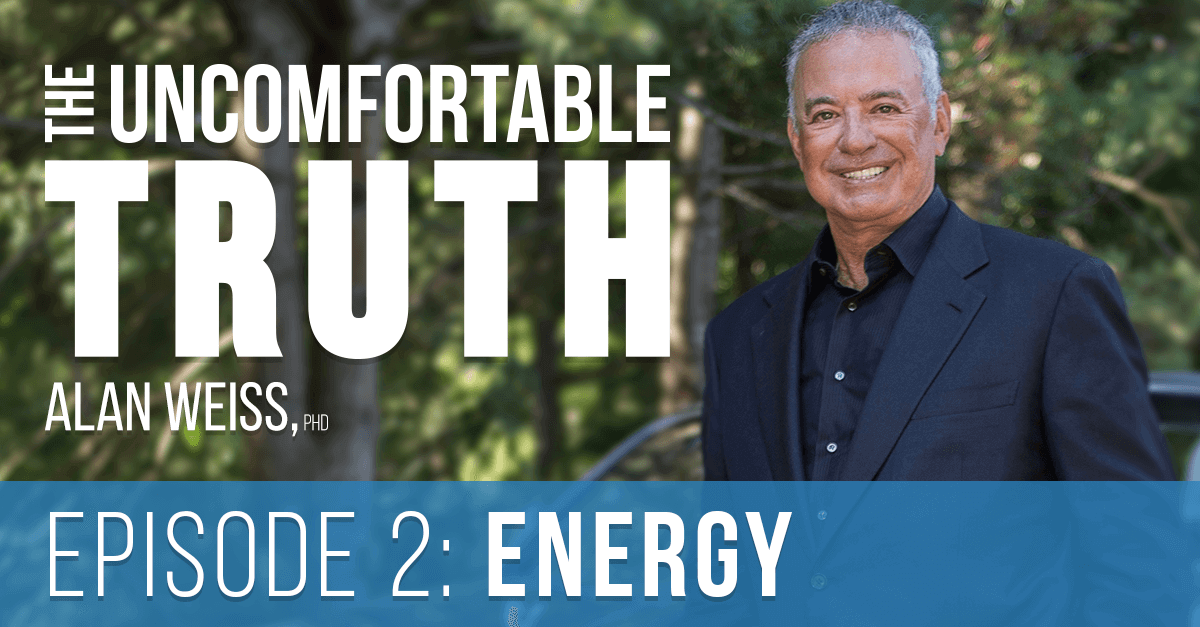
Episode 2: Energy
How the Second Law of Thermodynamics can erode your business and your life if you don't renew yourself.
Transcript:
Ellen white's here, welcome to my podcast on Energy. Henry David Thorough is credited with saying, “Most men lead lives of quiet desperation” what Thorough actually said if you read Walden is, “The mass of men lead lives of quiet desperation” but in any case why is that? Well it's because people feel they have no power, no influence, on control. If I could paraphrase you might say instead of an unexamined is not worth living, I think that was Socrates, a plateaued life is not worth living. The second law of thermodynamics says that entropy will erode a plateau if no new energy is introduced into the system. That is, a plateau will not last forever, if you don't introduce energy it erodes because it uses up the energy it has.
Consequently for all of us, unless we're growing we're on a plateau and it's going to erode. So where are you getting your energy input from? What new energy are you bringing into your system? It needs to be external. It needs to be from the outside world, from travel, from experiences, from coaches, from colleagues. Even experts and thought leaders constantly experiment. They constantly try. Constantly fail. Constantly win. As opposed to the calcified college professors who have tenure and are on a plateau that's steadily eroding, and read you their dissertation papers or their leftist manifestos, but they're not out their learning because they think they know it all and their protected.
The mind requires exercise. There are as many errors of omission as there are of commission. And that's because, as Marshall McLuhan said, “Eternal vigilance creates indifference” if you try to eternally monitor something you get bored. Look at these TSA people at the airports. They change people on the screens regularly, they rotate them, they go do a different job, but nonetheless they miss things. When I'm not in the pre-check lines, because an airport doesn't have them, sometimes I forget to take my liquids out because I'm not used to doing it anymore, and they miss the fact that they're in there. When they're tested by their own people the TSA has found that occasionally they miss guns and knives. That's because when we try to be eternally vigilant we make errors of omission.
Unconscious competency leads to mediocrity, because if we don't examine what we do, if we don't consciously try to get better at what we do, then we simply rely on our unconscious then we get lazy and complacent. If I try to make a tie knot, a proper half-Windsor tie knot, without just doing it automatically, I have trouble doing it when I start to think about it. Now that might be a character defect on my part, but it's more likely since I seldom do it anymore unless I do it from mental memory, institutionalized memory, I can't do it. I have to go back into conscious competency, loop this over here and pull this through there.
How could a bus driver, you might ask, well I ask, hit a pedestrian? Well it happens. Somebody was killed not long ago in Providence when a bus made a turn and hit them. Now how could that happen, the bus was going perhaps 5 or 8 miles an hour. It's because bus drivers do the same thing every day, and the same routes, and sometimes they just lose their attention. Their not vicious, they're not malicious, they're not incompetent, but they can't pay attention to every detail every minute because it's boring.
Planes have been known to land on the wrong runways. In Chicago somebody landed a DC-10 once, which is jumbo jet, at the wrong airport. Not fit for those jets. A smaller commuter airport. Now you might say that's some piloting skill because you've got this huge behemoth of an airplane down on a short and narrower runway, but on the other hand he was in the wrong airport. Lucky he was in the right city I guess? What did that do to his efficiency rating? But except for landing and takeoffs in most instances the plane's on automatic pilot, and that's why they force pilots to go through checklist. They force the co-pilot to read a list that the pilot has to acknowledge. Light is green, switch is off.
Despite all that, a few years back an American airlines pilot sitting at a New York airport looked up as he was taxiing and saw a continental jet landing with it's landing gear up, not down. Not deployed. He called the tower, the tower called the plane, and the plane got out of there just in time. These two pilots read the list and went through it and still didn't put down the gear. It wasn't a technical error. So what's your mental gym?
I'll give you some examples, I just worked out this morning and boy am I ornery. You can create and innovate. Try new things. Create something different. You can do puzzles, write, problem solve, learn new skills, take on new hobbies, learn about music and art, travel, read fiction, engage in intelligent debate. And let me digress, when I say intelligent debate I do not mean the current political debate, which is non-intelligent. When you think people who disagree with you are somehow mentally inferior or deplorable, that's not healthy. Back to my regular programming.
So these are ways that you can exercise your mental gym, in your mental gym, every morning. It's not about Facebook. It's not about repetition, it's not about shortcuts. You know the kids in school who cheated, cheated themselves. The kids in school who cheated to get by and were successful, they weren't caught, had that behavior reinforced and they just cheated themselves, because once you get to be an adult and you're engaged in the vicissitudes of life you can't cheat your way through that.
So you also have to stay fit in a lot of different ways. You have to stay physically fit. If you want to build your energy, if you want to keep high energy, besides mental fitness you need to be physically fit. I don't mean skinny, I don't mean slim, I don't mean supermodel, but I mean fit and healthy. People of all weights can be fit and healthy by and large, and so why not do the best you can to stay in the best shape you can for terms of blood pressure, cholesterol, heart rate, and all kinds of things like that. You have to be emotionally fit, that is you have to have perspective and freedom from sadness and regret. A lot of you have heard me say that pain is unavoidable, but suffering is voluntary. So you have to be emotionally fit if you want high energy. You have to give up regretting things, and instead make the best of the hand you're dealt.
You have to be psychologically fit, unfearing. You have to have moderate stress, not no stress, that's impossible. Enough stress to keep your adrenaline high, to create a sense of urgency, and not feel guilty at any time. One of the biggest compliments I've received is from one of my clients wives I know, and she said, “The thing about Allen is, he's fearless” and we have to be unfearing. I don't mean that you should not fear a tornado or somebody with a gun, I mean in common everyday parlance and situations, it's silly to fear the regular, the average, and the expected.
You have to be intellectually fit. You have to be informed, aware, and factually based, not alternative facts. Not opinion as fact. If you get all your news from television, or all your news from one newspaper, or all your news, god forbid, from social media, you are not intellectually fit. And then you have to be socially fit. You have to be sensitive to social cues, you have to know when to offer something, to be generous, to pick up a check, to get out of the way, to let someone else make the decision, not to argue about taste. You have to be a contributor.
And so you have to make sure that you stay physically fit, emotionally fit, psychologically fit, intellectually fit, and socially fit and these things will raise and sustain your energy levels. We all have power, all of us have power. It's not a question of acquiring power, the problem is we surrender power, and women are worse at this than men. Easy of me to say behind a microphone in my office, but nonetheless it's true. And so too often we surrender power by sacrifice. We give it away to our parents, or our siblings, or our partners, or at work. We say we don't want to rock the boat. We say, “What can you do, she's always been like that” you say, “Well they have a point I'm better off than they are” you can't be a martyr. You can't sacrifice your power.
Some people give away power by denying. They start sentences all the time with, “I can't”, “I shouldn't” they ask, “Why would they listen to me?” And so they're self disparaging, self-undermining. Some people surrender power because they're clumsy. They use poor language, or they're timid. They're not quite sure how to get things done, and so they stumble around. Some people sacrifice power because they're fearful. “What if I did this and that happened?”, “What if I offended someone?”, “What if they don't like me anymore?” And some people surrender power because they don't understand it. Power's not about money for example, it's about confidence. It's about presence. It's about volume. It's about language.
So power is not static. We can sacrifice it, deny it, be clumsy about it, lose it out of fear, or through misunderstanding, but we can also gain it. We can gain power through learning, through experiences, through assertiveness, through performance excess, through leadership, through coaching. Through all these things and more we can gain power, and the more power we have the more energy we have and the more energy we have the more power we can have. It is a virtuous circle.
So the key here, among other, is to work hard and not smart. You should build in down time every day. I recently saw an article done by some Dutch researcher, who asked high productive, high performance people what their secret was for balancing their lives. And every single one of them in one form or another said, “I build in, I schedule in my diary, downtime. Time with my family. Time to play. Time to just sit and think. You should build in downtime every day” I used to have a program called the Weekly Sabbatical®. You can still get all the past episodes on my site. Why not a daily sabbatical for an hour a day. You can start things early but never finish late.
You know one of the key aspects in the speaking profession, one of the tenants of a good speaker is it's okay to finish 5 or 10 minutes early, nobody objects to finishing a presentation early, but don't finish two minutes late. Once you finish past your ending time people immediately begin to wander mentally, if not physically, and they wonder about their next appointment, the phone call they had to make, the drink they wanted to have, and they forget everything you said, not just the last several minutes.
So never finish late. Energy does diminish over a day. No matter how much you start with it diminishes. So don't have elective surgery in the late afternoon, doesn't that sound horrible and frightening? But I'm very serious about it. I've asked a lot of surgeons, they are at their best and brightest earlier in the day. Especially people who do repetitive operations and surgeries during the day. They do only, let's say, joint work, or they do only internal work, or they do only cosmetic surgery or orthopedic work. The point is that when they're doing the same operations over and over what happens? You can have errors of omission, and the tired-er they get the more tired they are, the worse the probabilities for having these, or maybe I should say the better the probabilities for having these.
I talked to my veterinarian once, and he said, “I had to put off your dog's surgery till later this afternoon we had some emergencies” I said, “Don't do it, do it tomorrow morning” he said “Why” I said, “are you as sharp in the late afternoon as you are in the early morning” he said, “Of course not” I said, “Question answered”
So energy diminishes over a day no matter how much of it you start off with. Don't seek financial or legal advice late in the day. Your advisors will be more tired, especially if they've been handling similar situations to yours. I've always thought people were crazy to see a therapist late in the day just because it made sense for their work schedule. That therapist has been listening for six or seven hours to people with problems, and a lot of them are exactly the same. So that therapist is probably going to give you rote advice, R-O-T-E advice, or simply mouth something off without really digging and investigating to see whether you have some unique issues that you're trying to unearth.
So my advice to you is reduce and eliminate your own repetitive tasks, outsource them. Give them away. Don't feel you have to do them, it's well worth the money. Do them less frequently, pay your bills on the 15th of the month and the last day of the month. Don't try to pay them every day. Change your approach, change your location. Go to a coffee shop and do something. Get out of your house. Do it with a friend. And take frequent breaks. One good reason I have lunch is it's a break in the day. Take snack time out. Healthy snacks. Run errands. Listen to music. Play with the dog. Do things to break up your day and take frequent breaks.
So try to get along with people around you, because arguing reduces energy, and the more strife and stress you have the more your energy is drained away, rapidly flowing out of the tank. So try to get along with people, try to control your sense of healthy outrage. Finalize even the unpleasantness that you might face. If it's as extreme or traumatic as a divorce or just making tough decisions, these things fester and kill energy. Take care of them. Make a final decision, and then move on. You've gone through the pain, don't suffer.
Eat sensibly. If you eat too much you get slothful, you get lazy, but if you eat too little you don't have the energy you need either, it reduces energy. So eat sensibly, don't go on nutty diets. And minimize failure work. Failure work is, by my definition, is that work that should've been done correctly the first time but wasn't and now you're doing it over, and if you can minimize this by doing it right the first time and by not doing other people's failure work for them when they've not done it right the first time you'll conserve a great deal of your energy.
So I hope this has helped with energy. Please think about some other offerings I have that support this, such as my live stream series, which you can find on my site, from anywhere in the world you can ask questions in real time and get the recording, and you can sign up at any time for Maverick. Monthly Maverick. Video, audio, and even a day with me in Boston if you hear this quickly enough. Finally my new book coming out, co-written with Marshall Goldsmith, is life storming from Wiley, and that should be out in late April. So it might not even be out by the time you hear this.
Thanks for listening, I'll talk to you again soon. Alan Weiss, out.






